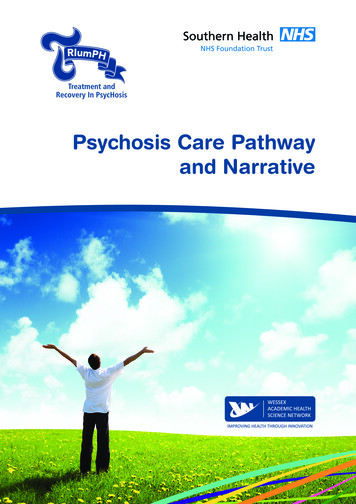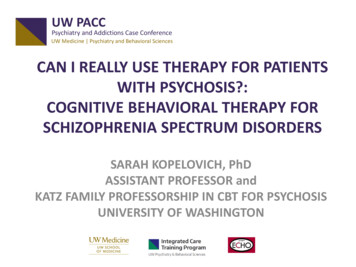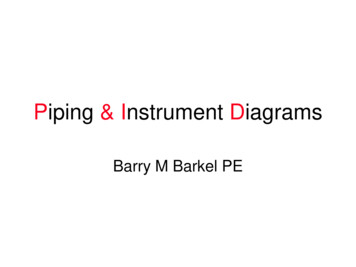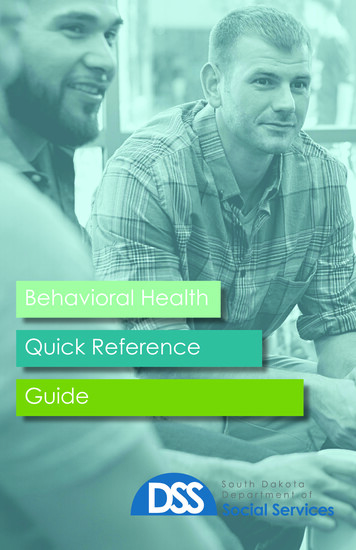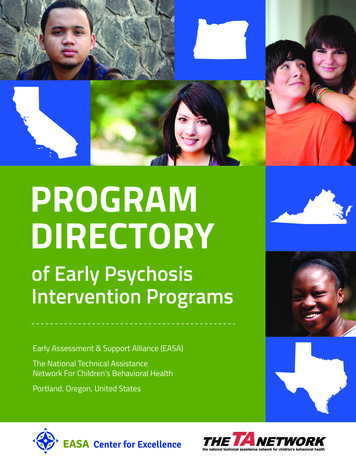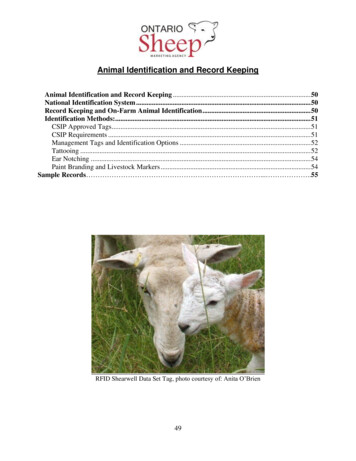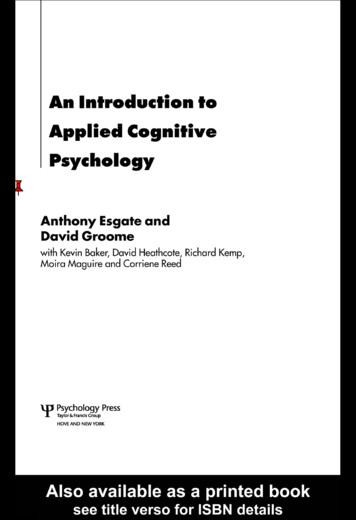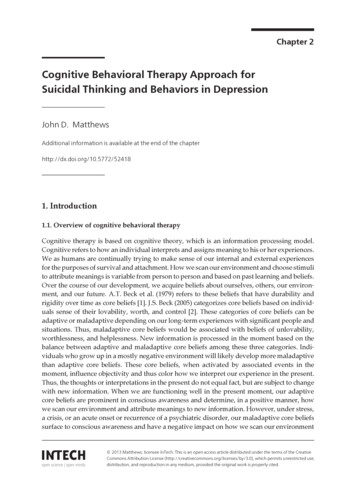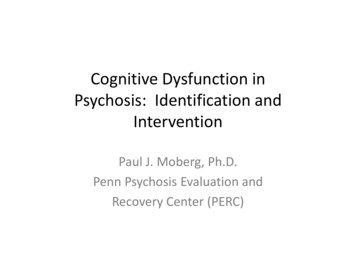
Transcription
Cognitive Dysfunction inPsychosis: Identification andInterventionPaul J. Moberg, Ph.D.Penn Psychosis Evaluation andRecovery Center (PERC)
PaulPublic Presentation: Bright 16 year old male Shy, introverted Socially anxious Grades dropped from A’s to B’s, then C’s,eventually D’s By junior year of high school, he was failingclasses Few friends, not initiating peer contact
Academic Difficulties emoryAcademic supports put in placeDiscontinued brief psychotherapy
What are reasons for neuropsychologicalassessment? Problems in organization and planningForgetfulnessDifficulty concentrating and sustaining studyingFirst-time evaluation - many adolescents or adultshave never received a clear diagnosis.Re-evaluation to determine change over time.Assessment of treatment effects.Request for accommodations in college, exams, etc.Understanding of own strengths and weaknesses forself and significant others (e.g., parents, spouse).
A typical neuropsychological evaluation willinvolve assessment of the following: General intellectual functioning Higher level executive skills (e.g., sequencing,reasoning, problem solving) Attention and concentration Learning and memory Language Visual–spatial skills (e.g., perception) Motor and sensory skills Mood and personality Some abilities may be measured in more detail thanothers, depending on the needs of the person
Name the color of the word BlueDid you have aYellowSTR OOPs! Effect?RedGreenBlueGreenHealthy persons activateAnterior cingulate when theyDetect errorsSelective ATTENTION
ABF: Abstraction &Mental FlexibilityEASYHARDCATEGORIZATION TASK
SPATIAL:Line OrientationEASYHARD
Cognitive Impairment Magnitude in SchizophreniaMeta-Analysis; 204 studies, 7420 patients and 5865 controlsCharacteristicprofile inschizophrenia:maximalimpairment inmemory, attention,and executivefunction; relativepreservation of oldlearning and visualperceptual skills.SD UnitsHealthy Comparison MeanHeinrichs & ZakzanisNeuropsychology 1998
Cognition in Psychosis:Core Feature of the Illness Present before onset of clinical symptoms Seen in unaffected first-degree relatives Relatively stable across clinical state; life spanuntil late adulthood Low cross sectional correlations with psychoticsymptoms Discrepancy between clinical and cognitiveeffects of antipsychotic medications
Cognitive Functioning in Prodromal Psychosis: A Meta-analysisPaolo Fusar-Poli, MD, PhD; Giacomo Deste, MD; Renata Smieskova, PhD; Stefano Barlati, MD; Alison R. Yung, MD; Oliver Howes,BM, BCh, MA, MRCPsych, PhD, DM; Rolf-Dieter Stieglitz, PhD; Antonio Vita, MD, PhD; Philip McGuire, BSc, MB, ChB, MD, PhD,FRCPsych; Stefan Borgwardt, MD, PhDArch Gen Psychiatry. 2012;69(6):562-571.
Cognitive Alterations Associated with Vulnerability to PsychosisThe largest deficits were seen in: Visual and Verbal Memory
Cognitive functioning in clinical high-risk subjects who later developed psychosis (HR-T)compared with HR subjects who did not develop a psychotic disorder (HR-NT)Verbal FluencyVerbal MemoryVisual MemoryWorking MemoryHedges' g scores (mean and 95% CI) across cognitive domains are given (negative values indicate worse performance inHR subjects who later developed psychosis compared with HR subjects who did not develop a psychotic disorder). Thedotted red line (Hedges' g 0) indicates no significant difference between HR-T and HR-NT. AT indicates attention; EF,executive functioning; GI, general intelligence; PS, processing speed; VF, verbal fluency; ViM, visual memory; VM, verbalmemory; WM, working memory.Paolo Fusar-Poli, et al. Arch Gen Psychiatry. 2012;69(6):562-571
RBANS results at different stages during the course of psychosis.Zhang T, Li H, Stone WS, Woodberry KA, Seidman LJ, et al. (2015) Neuropsychological Impairment in Prodromal, First-Episode,and Chronic Psychosis: Assessing RBANS Performance. PLoS ONE 10(5): e0125784. os.org/plosone/article?id info:doi/10.1371/journal.pone.0125784
Neurocognitive Deficits are related to FunctionalOutcomeCommunity FunctioningNeurocognitiveDeficitsLarge -Medium -Small -Instrumental &Problem Solving .50.40.30.20.10.0All P’s VigilanceSummaryScoresGreen et al, 2000
Penn Group Studies
The computerized battery:Illustration of test stimuliGur et al., Neuropsychology, 2012
Neurocognitive Profile of Psychosis Spectrum (PS, n 1171)Compared to No Psychosis (NP, n 3684) Age 11-21Calkins et al., WJP 2015
SpeedMemoryAttentionReasoningTact/Social cognitionSynthesisEffect Size (Cohen's d )Cognitive deficits in emoryCognitive deficitsin psychosis arePervasivePersistentPresent earlyProgress earlyPredict functional ngSocial CueRecognitionEffects Sizes (Cohen’s r):Neurocognitive Deficits and Functional OutcomeCommunity FunctioningNeurocognitiveDeficitsInstrumental &Problem Solving SkillsSkill Acquisition0.70.6Large - 0.50.4Medium - 0.30.2Small - 0.10.0VerbalMemoryGreen et al. 2000ImmediateMemoryExecutiveFunctionsVigilance SummaryScores
Person-Centered Approach
Variability in performance can be helpful or hurtfulThink about the first time you rode a bike. At first you wobble,but over time you learn to control the bike. The wobbling in thebeginning helped you (and your brain) figure out the best way toto ride a bike!
Variability in performance can be helpful or hurtfulNow that you know how to ride a bike you don’t wobble much. Buta bumpy road, a flat tire or talking on you cell phone while ridingyour bike will cause you to wobble more. Too much wobbling fromthese problems or distractions may cause you to fall!A similar thing can happen in the brain.
Some people show more inconsistency (“wobble” ) in their performance on tests of abilityPushsPCPTnl:the buttonwhenseesubjectthe letter XHigh vsLow IIVSlowsPCPTnl: High vs Low IIV subject600300Average Total Response Time (ms)Average Total Response Time (ms)900SubjectSubjectHigh IIV600Atypical (big wobble)Typical(little wobble)LowIIVHigh IIVLow IIV300FastHow quickly was the button pushed?90000TrialTrialTrial
Inconsistency in performance(“wobble”)Inconsistency (“wobble”) can get better, stay the same, or get worse over timeTimeNeuroscientists are working on the best ways to study this brain ‘wobble’.They hope to figure out when it is a good thing and when it is a bad thing.
What are Possible Treatments forCognitive Dysfunction?
Pharmacological Treatments for CognitionEffect Size (Cohen'sd)Enter: cognitive remediation10.9(L) 0.80.70.6(M) 0.50.40.3(S) 0.20.10Antipsychotics d-Cycloserine(KeefeGlycineGalantaminePractice Effect
Key Cognitive Remediation Points Brain is remarkably plastic Altered neuroplasticity and psychosis Plasticity based interventions may remedycognitive deficits
The power of plasticityPhysical PracticeMEG activityMotor cortexDay 1234545Mental PracticeDay 123Pascual-Leone et al. JNP 1994
London Taxi drivers (A) have larger hippocampithan matched control subjects (B)McGuire 2009
WorseBetterCognitiveremediationworks!Til Wykes et al al 2011The meta-analysis (2,104participants) yielded durableeffects on global cognitionand functioning.
PERC Cognitive Remediation 8 –Week ProgramCognitive training, education, support Cognitive Remediation– Weekly 2-hour group that meets in NeuropsychiatryProgram at HUPurs)– Focus on cognitive impairments commonly seen inpsychiatric illness such as attention, memory, problemsolving, etc.– Computer exercises (BrainHQ), both in group (weekly)with coaching by clinicians and at-home (daily) by theparticipant– In addition, participants learn behavioral compensatorystrategies that mesh with computer training Computer exercises done in group & at-homeGroup Exercises–––Training in utilizing compensatory and organizationstrategies in real-lifePractice in perspective-taking, non-verbalcommunication, emotional temperatureperception, etc.Socialization, cognitive trouble-shooting and dealingwith barriers to training/practiceGroup sessions with exercises and homework
Other approaches: Cognitive adaptation is ofvalue as well (Velligan et al 2006)
Take home points The brain has a remarkable ability to repair itself, a phenomenon known as plasticity Cognitive deficits (Speed, Memory, Attention,Reasoning, Tact, Synthesis) are related to altered brainplasticity Cognitive deficits and the brain changes may bereversible with neuroplasticity based cognitiveremediation, have durable real-world benefits Cognitive remediation works best when it isRepetitive, Adaptive, Individualized, Strategic andincludes a Motivational component. Deficits in brain plasticity may set in early. Earlyintervention may have large positive implications foroutcome
The brain has a remarkable ability to repair itself, a phenomenon known as plasticity Cognitive deficits (Speed, Memory, Attention, Reasoning, Tact, Synthesis) are related to altered brain plasticity Cognitive deficits and the brain changes
